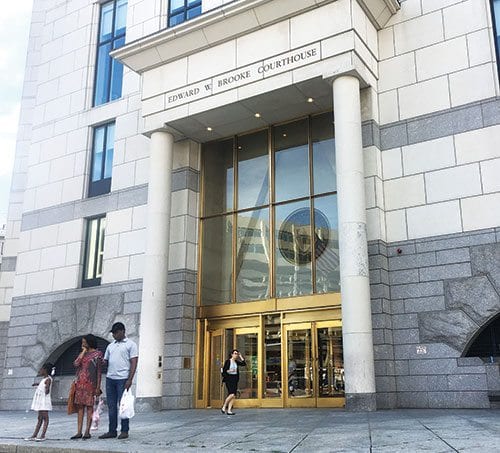Race bias alleged in Mass. trial courts
Civil rights lawyers: Racial harassment rampant; few women of color employed

Courts seeking to remedy injustices and inequities would do well to look at their own practices, according to a letter from the Lawyers’ Committee for Civil Rights and Economic Justice. Many working in Massachusetts’ Trial Court system report “a toxic racially-charged hostile environment that fosters identity-based harassment,” writes Oren Sellstrom of the Lawyers’ Committee.
According to data and employee accounts gathered by the Lawyers’ Committee, mockery based on race, ethnicity, accented English speech or being an immigrant is not uncommon in the Court Security and Probate and Family Court. Additionally, the Trial Court workforce fails to reflect the diversity of those seeking justice and assistance before them. In particular, there are few women of color employed or in supervisory positions, which the Lawyers’ Committee attributes in part to a promotional exam they deem flawed.
On behalf of the Massachusetts Minority Court Officers, the Lawyers’ Committee sent a letter to Court Administrator Jonathan Williams last week, demanding a package of reforms to revise allegedly discriminatory promotional practices, make employee demographic information more publicly available and improve hiring and promotion of qualified candidates of color.
“Government agencies should broadly reflect the communities they serve. Nowhere is this more important than in the Trial Court, where equal justice is a fundamental principle,” the Lawyers’ Committee said, calling for a proactive and robust effort to alter what appear to be longstanding issues.
In a statement to the Banner a Trial Court spokesperson said that the court continues on two years of work to address issue around race and implicit bias. “The Trial Court is committed to having a diverse workforce,” the spokesperson said.
Racial climate
According to the Lawyers’ Committee, employees report being subjected to racial slurs and demeaning comments. Immigrants allegedly have been hit with comments about getting deported and Latinos mocked for their English. Beyond depriving employees of dignity, this climate discourages employees from using non-English language interpretation and translation skills that make the courts more accessible to many residents of Boston’s sizable immigrant population, Sellstrom says.
Employees also said that reports of race-based incidents often went uninvestigated, that employees of color were relegated to more menial work and that minorities received disparately severe discipline compared to white peers.
Complaints recounted by the Lawyers’ Committee are reminiscent of the dispute over the suspension of Felix D. Arroyo, the first person of color to serve as registrar of the Probate Courts, a division of the Trial Courts system. In February 2017, Arroyo was put on paid administrative leave with reasons not yet made public. His lawyer said Arroyo was impeded as he sought to improve departmental functioning, diversify staff and hire multilingual staff able to assist non-English speakers.
Patrick Keaney, Arroyo’s campaign manager, recently said in a letter to supporters that Arroyo remains suspended, while people cited openly by the media for having used racial slurs and protected racist employees continue to go to work.
In its statement to the Banner, the Trial Court said that race and bias considerations factored into the strategic plan issued in 2016. Measures taken by the Trial Courts include cultural competency training for probation officers, department conferences in which personnel meet over racial and cultural sensitivity issues and bias, the appointment of a new chief experience and diversity officer and an administrative attorney charged with investigating discrimination allegations as well as with standardizing investigation practices.
Face of the courts
Furthermore, Sellstrom says that a visibly-diverse workforce fosters trust, with those seeking services reassured of unbiased treatment when they can see people who look like them employed at the court. Of the more than 1,000 court officers employed statewide, approximately 6.7 percent are women of color. Some courthouses have few to no women of color in their security departments. For instance, security at the John Adams Court House in downtown Boston comprises only white men, according to Lawyers’ Committee data.
The number of women of color drops off dramatically in supervisory positions, according to Lawyers’ Committee data. Of the roughly 90 managerial roles in the Security Department only 4 percent are held by women of color. These rates have changed little since 2011.
The Lawyers’ Committee identified the promotional system as one possible driver of the disparities. That process involves both an exam and an interview, but complaints about the workplace’s racial climate prompt concerns about the impartiality of these interviews. Additionally, Sellstrom told the Banner that written tests often are found not to effectively capture the skills involved in doing a job well. When the exam was administered in 2015, candidates of color were twice as often disqualified from promotion based on their exam scores than white candidates were. Given the disparity, onus may fall on the department to demonstrate that there is no less equally or more information assessment measure that could be used without the disparate impact, or to discontinue the test’s usage. These issues contribute to a perception that promotions are handled more based on connections and favoritism than merit and productivity, Sellstrom states. The Lawyers’ Committee also expressed concern that the same exam that produced disparate impact in 2015 is slated for use in fall 2017 as a basis for promotional decisions.
In a statement, the Trial Court defended its promotional evaluations as based on “work performance, knowledge and skills relevant to the job,” and said the exam was introduced in 2011 as an reform effort to make the process more objective. The spokesperson also said that intial hiring is a “competitive, merit-based process.”


![Banner [Virtual] Art Gallery](https://baystatebanner.com/wp-content/uploads/2024/04/Cagen-Luse_Men-at-store-e1713991226112-150x150.jpg)



